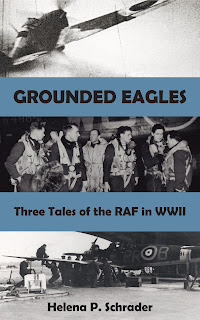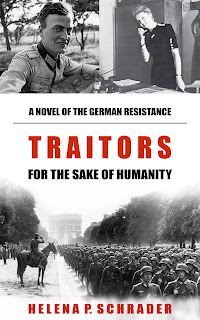Today I continue my series on why I write by looking at how the desire
to question the popular narrative has often given birth to a novel. When
confronted by the sharp contrast between popular perceptions and
scholarly assessments of an age or society, I'm often inspired to write
books that challenge popular misconceptions. My goal is to provoke my
reader into questioning common cliches and conventional wisdom along
with me.

It
all started with the German Resistance to Hitler. Raised by my Danish
mother on tales of the heroic Danish Resistance to Hitler it came as a
shock to learn, while still in graduate school, that there had been a German Resistance
too. After all, the Danes (and French and Poles and Russians) had all
been fighting an evil invader, a brutal and monstrous outsider. The
German Resistance to Hitler, on the other hand, was fighting their own
government, their own institutions and ultimately their
fellow-citizens. Unlike the other resistance movements, the German
resistance was not nationalist but moral in character.
That
got me thinking -- and questioning -- the common assumptions about Nazi
Germany and the Germans of this period. This led me to nearly twenty
years of research, a move to Germany and ultimately a PhD from the
University of Hamburg. My dissertation was based on previously untapped
primary sources and enabled me to reconstruct the role of one of the
leading members of the conspiracy against Hitler. It was a
ground-breaking biography which received first-rate reviews in every
major German newspaper and sold out within three months. And all because I had started questioning what was being said not only by students but what was in the history books as well.
After so many years focused on one of the most inhumane, corrupt,
brutal and cynical periods of human history -- not to mention the
dreadful fates of those few who futilely attempted to oppose the forces
of evil, I literally never wanted to see another book, film or article
about the Nazi period. I needed a completely new focus for my research
and writing.
I
found my new "cause" in Ancient Sparta. Again, I discovered (more by
chance than choice) that Spartan women enjoyed education and economic
power at a time when Athenian (and most other Greek) women were treated
like the women of the Taliban. What? How? Why was that? I asked.
My
questioning led me to discover a Sparta radically at odds with the
common image fed us daily by Hollywood and even pseudo-history sources
like The History Channel and Wikipedia. I was off again - questioning,
learning and exploring. My travels took me to Sparta, and an encounter
with a fertile, rich and beautiful place, which made my questions all the more
incessant and pointed. I've shared the answers to my questions on my
website: http://spartareconsidered.com and of course, in my novels set
in Ancient Sparta.

More
recently, as a result of my encounters with Islam, I started to
question the politically correct version of the crusades. Nigeria in the
age of Boko Haram, the systematic assaults on moderate Imams in
Ethiopia, developments in Sudan, Somalia, Iran, Iraq, Turkey and, yes,
Afghanistan make the politically correct and popular portrayal of the
Medieval Muslim world as a place of tolerance, benevolence and
non-violence hard to fathom. I started questioning what I had learned at
home and in school, and I came to my own conclusions -- based very much
on the recorded facts and the writings of contemporaries, both
Christian and Muslim.

History
is never black and white, it is always full of shades of grey. Humans
are by nature complex and fallible. Good people sometimes make bad
decisions or do unpleasant things; even predominantly bad people usually
have redeeming features. Indisputable facts are rare because the
historical record is almost always subjective, biased or just plain
incomplete. Narratives can be interpreted in conflicting, even
contradictory ways. People, all people, have friends and enemies, and
how we see them hundreds of years later will depend on whether the
former or the later wrote the documents we discover. Precisely because
history is so complex and nuanced, questioning is never wrong.
That
desire to question the conventional and familiar view of things is one
of my driving reasons for writing historical fiction.
Riding the icy, moonlit sky, 
they took the war to Hitler.
Their chances of survival were less than fifty percent.
Their average age was 21.
This is the story of just one bomber pilot, his crew and the woman he loved.
It is intended as a tribute to them all.
Buy now on amazon
or Barnes and Noble.
 Disfiguring
injuries, class prejudice and PTSD are the focus of three
heart-wrenching tales set in WWII by award-winning novelist Helena P.
Schrader. Find out more at: https://crossseaspress.com/grounded-eagles
Disfiguring
injuries, class prejudice and PTSD are the focus of three
heart-wrenching tales set in WWII by award-winning novelist Helena P.
Schrader. Find out more at: https://crossseaspress.com/grounded-eagles

"Where Eagles Never Flew"
was the the winner of a Hemingway Award for 20th Century Wartime
Fiction and a Maincrest Media Award for Military Fiction. Find out more
at: https://crossseaspress.com/where-eagles-never-flew
For more information about all my books visit: https://www.helenapschrader.com









No comments:
Post a Comment